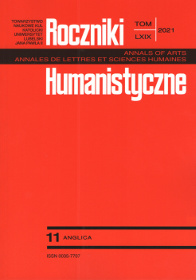The House on Mango Street: A Parable of Degeneration or a Chicana Rewriting of Charles Kingsley’s The Water-Babies
Abstract
Reading Charles Kingsley’s The Water-Babies (1863) makes it possible for Esperanza Cordero to imagine an idyllic site of empowered identity in The House on Mango Street. Yet, I argue that Esperanza’s transformed identity can only reside outside her original community and that her journey from the sad red house of Mango Street to her reconceived clean house at the end of the text is necessarily a trajectory of desired uprootedness that follows the script presented in The Water-Babies. Like Tom, Kingsley’s protagonist, Esperanza undergoes a metamorphosis to shed off the traits that categorize her as Chicana in order to embrace a remodeled subjectivity and, consequently, become an ontologically deterritorialized Hispanic.
References
Bhabha, Homi. “Signs Taken for Wonders: Questions of Ambivalence an Authority Under a Tree Outside Delhi, May 1817.” Critical Inquiry, vol. 12, no. 1, 1985, pp. 144–165.
Beer, Gillian. Darwin’s Plots: Evolutionary Narrative in Darwin, George Eliot and Nineteenth-Century Fiction. 1983. Cambridge UP, 2009.
Bradford, Clare. “The End of Empire? Colonial and Postcolonial Journeys in Children’s Books.” Children’s Literature, vol. 29, no. 1, 2001, pp. 196–218.
Conlin, Jonathan. “An Illiberal Descent: Natural and National History in the Work of Charles Kingsley.” History, vol. 96, no. 2, 2011, pp. 169–187.
Cisneros, Sandra. The House of Mango Street. Vintage, 1991.
Cunningham, Valentine. “Soiled Fairy: The Water-Babies in Its Time.” Essays in Criticism, vol. 35, no. 2, 1985, pp. 121–148.
De Lauretis, Teresa. Alice Doesn’t: Feminism, Semiotics, Cinema. The Macmillan Press, 1984.
Domínguez Miguela, Antonia. “Views of the Barrio in Chicano and Puerto Rican Narrative.” AMERICAN@, vol. 3, no. 1, 2005, pp. 59–70.
Eliade, Mircea. Patterns in Comparative Religion. Translated by Rosemary Sheed. 1949. Sheed and Ward, 1958.
Hall, Catherine. “Men and Their Histories: Civilizing Subjects.” History Workshop Journal, vol. 52, no. 1, 2001, pp. 49–66.
Herrera-Sobek, María. “The Politics of Rape: Sexual Transgression in Chicana Fiction.” Chicana Creativity and Criticism: New Frontiers in American Literature, edited by María Herrera Sobek and Helena María Viramontes. U of New Mexico P, 1996, pp. 245–256
Hodgson, Amanda. “Defining the Species: Apes, Savages and Humans in Scientific and Literary Writing of the 1860s.” Journal of Victorian Culture, vol. 4, 1999, pp. 228–251.
Hunt, Peter. Children’s Literature: An Anthology, 1801–1902. Blackwell, 2001.
Jacobs, Elizabeth. Mexican American Literature: The Politics of Identity. Routledge, 2006.
Jenkins, Ruth Y. “Imagining the Abject in Kingsley, MacDonald, and Carroll: Disrupting Dominant Values and Cultural Identity in Children’s Literature.” The Lion and the Unicorn, vol. 35, no. 1, 2011, pp. 67–87.
Kaup, Monika. “The Architecture of Ethnicity in Chicano Literature.” American Literature, vol. 69, no. 2, 1997, pp. 361–397.
Kincaid, Jamaica. “Wingless.” At the Bottom of the River. Farrar, Straus and Giroux, 1983, pp. 23–24.
Kingsley, Charles. The Water-Babies: A Fairy Tale for a Land Baby. 1863. Penguin Popular Classics, 1995.
Kingsley, Frances Eliza Grenfell, editor. Charles Kingsley: His Letters and Memories of His Life, in Two Volumes, vol. 2, Macmillan, 1894.
Klaver, J. M. I. Apostle of the Flesh: A Critical Life of Charles Kingsley. Brill Academic Publishers, 2006.
Levander, Caroline F. “The Science of Sentiment: The Evolution of the Bourgeois Child in Nineteenth-Century American Narrative.” Modern Language Studies, vol. 30, no. 1, 2000, pp. 27–44.
Lewis, Christopher Alan. “Cleanliness Is Next to Godliness: Religiosity and Obsessiveness.” Journal of Religion and Health, vol. 37, no. 1, 1998, pp. 49–61.
Mcclintock, Anne. “Soft-Soaping Empire: Commodity Racism and Imperial Advertising.” Travellers’ Tales: Narratives of Home and Displacement, edited by George Robertson et al. Routledge, 1994, pp. 129–152.
Olivares, Julian. “Sandra Cisneros’s The House on Mango Street and the Poetics of Space.” Chicana Creativity and Criticism: New Frontiers in American Literature, edited by María Herrera-Sobek and Helena M. Viramontes, U of New Mexico P, 1996, pp. 233–244.
Ostry, Elaine. “Magical Growth and Moral Lessons; or, How the Conduct Book Informed Victorian and Edwardian Children’s Fantasy.” The Lion and the Unicorn, vol. 27, no. 1, 2003, pp. 27–56.
Padley, Jonathan. “Marginal(ized) Demarcator: (Mis)Reading The Water-Babies.” Children’s Literature Association Quarterly, vol. 34, no. 1, 2009, pp. 51–64.
Rapple, Brendan. “Charles Kingsley’s The Water-Babies: The Spiritual and Physical Cleansing Properties of Water.” Children’s Literature Association Quarterly, 1989, pp. 42–46.
Roediger, David. The Wages of Whiteness Race and the Making of the American Working Class. Verso, 2007.
Rodríguez, Juan. “The House on Mango Street, by Sandra Cisneros.” Austin Chronicle, August 10, 1984, pp. 50–56.
Schülting, Sabine. Dirt in Victorian Literature and Culture: Writing Materiality. Routledge, 2016.
Stavans, Ilan. “Sandra Cisneros: Form Over Content.” Academic Questions, vol. 9, no. 4, 1996, pp. 29–34.
Stevenson, Deborah. “Sentiment and Significance: The Impossibility of Recovery in the Children’s Literature Canon or, the Drowning of The Water-Babies.” The Lion and the Unicorn, vol. 21, no. 1, 1997, pp. 112–130.
Straley, Jessica. “Of Beasts and Boys: Kingsley, Spencer, and the Theory of Recapitulation.” Victorian Studies, vol. 49, no. 4, 2007, pp. 583–609.
Tapping, Craig. “Oral Cultures and the Empire of Literature.” Kunapipi, vol. 1, no. 1, 1989, pp. 86–96.
Wallace, Jo-Ann. “De-Scribing The Water-Babies: ‘The Child’ in Post-Colonial Theory.” De-Scribing Empire: Post-colonialism and Textuality, edited by Chris Tiffin and Alan Lawson, Routledge, 1994, pp. 171–184.
Walker, Lynne. “Home Making: An Architectural Perspective.” Signs, vol. 2, no. 3, 2002, pp. 823–835.
Wood, Naomi. “A (Sea) Green Victorian: Charles Kingsley and The Water-Babies.” The Lion and the Unicorn, vol. 19, no. 2, 1995, pp. 233–252.
Yan, Shu-chuan. “Between Fact and Myth: The Kingdom of the Nonhuman in the Victorian Literary Imagination.” Concentric: Literary and Cultural Studies, vol. 33, no. 1, 2007, pp. 223–251.
Copyright (c) 2021 Roczniki Humanistyczne

This work is licensed under a Creative Commons Attribution-NonCommercial-NoDerivatives 4.0 International License.





